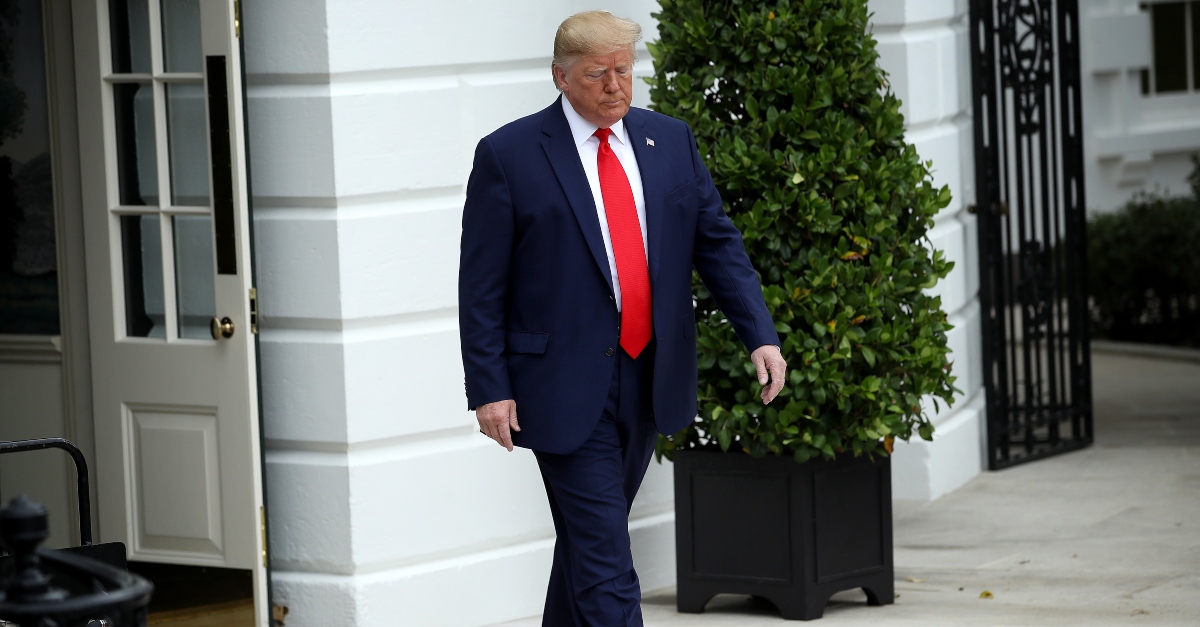
A federal court on Friday determined that President Donald Trump’s tax returns must be provided to congressional investigators. And the opinion itself is rife with references to the Watergate scandal.
In a two-to-one decision authored by the U.S. Court of Appeals for the District of Columbia, Trump’s accounting firm Mazars USA, LLP was ordered to comply with a subpoena issued by the U.S. House Committee on Oversight and Reform on April 15 of this year.
“Having considered the weighty interests at stake in this case, we conclude that the subpoena issued by the Committee to Mazars is valid and enforceable,” the three-judge panel concluded at the end of the decision. “We affirm the district court’s judgment in favor of the Oversight Committee and against the Trump Plaintiffs.”
Crucial to the court’s decision was the ever-looming historical, statutory and judicial precedent of the Watergate scandal.
“In order to explain the impetus behind the subpoena, we must go back to the Ethics in Government Act of 1978,” the judges note. “Enacted in the wake of the Watergate scandal, that statute requires many aspiring and current government officials, including presidential candidates and sitting Presidents, to file financial disclosure reports at various times during their candidacies and incumbencies.”
Due to the Stormy Daniels affair, concerns were raised by a non-partisan government accountability watchdog organization. Those concerns found their way to the acting director of the Office of Government Ethics, David Apol, who, in turn, forwarded them onto then-Deputy Attorney General Rod Rosenstein. In a letter, Apol categorized the presidential hush money payment made to Daniels as “a reportable liability under the Ethics in Government Act.”
House Democrats initially chased down Trump’s tax returns and related financial information related to the hush money payment and this inquiry culminated into former Trump friend and attorney Michael Cohen testifying before Congress about other allegedly untoward and unlawful accounting tricks used by the 45th president.
The court summarized the Cohen testimony:
He testified that he believed, based on his experience working for President Trump, that the President had “inflated his total assets when it served his purposes” in some situations and had “deflated his assets” in others.
The current impasse ensued as sternly-worded requests for documents became officially-issued subpoenas in the hands of the newly-emboldened Democratic House majority in early 2019.
The court noted that such protracted fights between Congress and the White House are actually exceedingly rare.
“Presidents, too, have often been the subjects of Congress’s legislative investigations, though fewer of these have required judicial intervention,” the court dryly notes. “Historical examples stretch far back in time and broadly across subject matters.”
An 1832 investigation into Andrew Jackson over fraudulent rationing contracts was resolved between the White House and Congress. Franklin D. Roosevelt and Congress eventually worked together on an investigation that looked into whether the president had “tricked, provoked, incited, cajoled, or coerced Japan into attacking” the United States. During the Iran-Contra investigation, Ronald Reagan ultimately relented to Congressional investigators and provided “relevant excerpts of his personal diaries” to Congress. Bill Clinton‘s White House even reached “a last-minute compromise” with the Senate to keep the courts out of a dispute over records.
The judicial and historical record only left the court one case on point:
Of all the historical examples, perhaps the most high-profile congressional investigation into a President—and the only one we have found that produced an appellate-level judicial opinion—was Congress’s investigation into President [Richard] Nixon. The Senate created the Senate Select Committee on Presidential Campaign Activities, better known as the Senate Watergate Committee, to investigate “illegal, improper, or unethical activities engaged in by any persons” involved in a campaign “conducted by… any person seeking nomination or election… for the office of the President of the United States” during the “Presidential election of 1972.”
“President Nixon, apparently taking no issue with the general power of congressional committees to subpoena sitting Presidents, instead asserted executive privilege over the individual tapes requested,” the court noted–and agreed with Nixon “in the peculiar circumstances of [that] case.”
Overall, however, the court ruled that congressional subpoenas based on genuine public interest and the need of Congress to potentially legislate are valid and enforceable.
“[E]ven though the Senate Watergate Committee ultimately lost, Senate Select Committee strongly implies that Presidents enjoy no blanket immunity from congressional subpoenas,” the court said. “After all, if such immunity exists, it would have been wholly unnecessary for the court to explore the subpoena’s particulars and to weigh” the president’s alleged confidentiality interest against Congress’s legislative interest.
And, the court notes, Congress’s pleaded legislative interest isn’t just legalistic gloss.
“In fact, the House has even put its legislation where its mouth is: it has passed one bill pertaining to the information sought in the subpoenas and is considering several others,” the opinion noted. “The Committee’s interest in alleged misconduct, therefore, is in direct furtherance of its legislative purpose.”
Appellate Court says House … by Law&Crime on Scribd
[Image via Win McNamee/Getty Images]